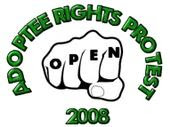 ANNISTON STAR
ANNISTON STARNovember 16, 2007
Phillip Tutor: Adopt this plan — Give them access
Let’s start an argument.
There are millions of adoptees in the United States, and only those living in eight states — yes, Alabama’s one of them — can legally get their birth records.
The name of their birthmother? Nope. The name of their birthfather? They can’t get it. Where they were born? Can’t get that, either.
Thus, most U.S. adoptees are the only Americans denied their family histories and medical histories. By the conditions of their birth, they are treated differently than anyone else born here. Even American-born children of illegal immigrants can access their birth records, a right given them by U.S. law.
But U.S. adoptees are cut off from their life stories, through no choice of their own, as though their citizenship and rights are not as valuable as those of others.
So, our argument:
Should U.S. adoptees have access to their birth records?
Yes.
It’s past time for this paradigm shift in our nation’s thinking about adoption and the rights of adoptees. Anything less perpetuates the stigma that’s unmercifully dogged adoptees for generations — a stigma that, slowly, diminishes with each passing decade.
Before we progress, two points should be clear. I’m an adoptive parent — an old story, written about it before. I’m also the parent of internationally adopted children, so my expertise is filtered through eyes with a particularly global hue. Just so you know.
This has bubbled up because November is National Adoption Month and Saturday is National Adoption Day, designed, according to its Web site, as a “collective national effort to raise awareness” for thousands of children in foster care awaiting adoption.
In 2006, more than 3,000 adoptions were finalized in National Adoption Day ceremonies in 50 states.
More important, the movement to allow adoptees access to their birth records is riding a wave of publicity — some positive, some vitriolic — thanks to the Evan B. Donaldson Adoption Institute, whose report released this week called for states to treat their adopted citizens as they do all others and grant them legal access to their records. And as you can expect, the report is wildly controversial in child-welfare and civil-liberty circles.
Advocates state the obvious, that adopted Americans should have the same right to know who their ancestors are. What they do with that information — contact their birth parents or simply obtain a birth certificate — is their choice.
Opponents such as the National Council on Adoptions, which represents many religiously affiliated adoption agencies, and a few state chapters of the American Civil Liberties Union are fighting for the privacy of the birthmothers, a critically important issue. In New Jersey — to show you how far this argument goes — representatives of that state’s Right to Life organization and the New Jersey Catholic Conference oppose giving adoptees access to their information. Why? They claim the loss of privacy might push women to choose abortion instead of adoption.
Understandably, abortion is an important argument.
But it’s not this argument.
We cannot lose sight of the enormity of the decisions made by women who place their children up for adoption. They are gut-wrenching, life-changing moments in the lives of women who either cannot take care of their child or for some reason choose not to. Whether they select open adoption or the traditional method that includes anonymity, the rights of birthmothers cannot be simply tossed aside.
Nor can we ignore the fact that there are adoptive parents who themselves struggle over the control of their children’s birth records. As an adoptive parent, it’s easy for me to understand that some parents of adoptees are adamantly opposed to having their son or daughter — their adult child, as it may be — contact a birthmother who relinquished her parental rights decades ago. Those are emotions that are acutely raw, and remain so. I know that first-hand.
Clearly, this isn’t a monochromatic, one-sided issue.
Nevertheless, we have to realize that the anonymity and sealed birth records were established in an era when adoption was neither a source of pride nor a process to cherish. Often adoption was a deep, dark family secret, rarely discussed for fear of the stigma that came with an adoption label. As Adam Pertman, executive director of the Donaldson Institute, told the Chicago Tribune: “Sealed records are a symbol of a time when adoption was an embarrassment.” And barring adoptees access to their birth records was the one sure way to protect the anonymity of those who had chosen to place their child up for adoption.
That time has passed.
There is no easy, clean answer. This argument is messy and complex. But some things should be done because they are right and just and humane.
This is one of them.
About Phillip Tutor:
Phillip Tutor is the commentary editor. He was formerly The Star's managing editor, news editor, sports editor and sports columnist. He lives in Golden Springs with his wife and two children.
Contact Phillip Tutor:
Phone:
Fax:
E-mail:
Link to article








No comments:
Post a Comment